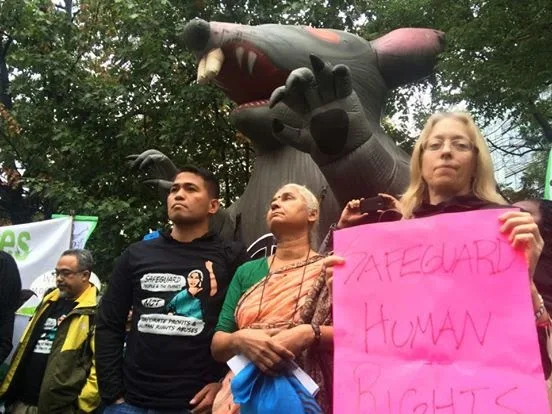 |
| India's Medha Patkar and other activists protest World Bank move |
The Human Rights Watch (HRW) has said that the World Bank Group's proposed policy on environmental safeguards, currently being discussed in Washington DC, is "a setback" from its previous rights-based approach, insisting, "Development cannot succeed if it harms communities." In a statement, HRW has said, "Indigenous peoples’ recommendations to strengthen World Bank standards and bring them into line with the UN Declaration on the Rights of Indigenous Peoples have fallen on deaf ears", adding, instead the World Bank has pledged on a ‘no-dilution’ of existing policies."
The top international NGO said, quoting independent groups, "Draft World Bank policies under consideration at the bank’s meeting on October 10-12, 2014, would dangerously roll back protection for communities affected by bank projects". The HRW added, this even as foreign ministers and central bankers met in Washington DC, to discuss "key challenges" in ending poverty and inequality.
"For human rights groups and community representatives, a critical issue is the World Bank’s revision of its safeguard policies, which are intended to protect people and the environment from harm. The World Bank and its member countries cannot end poverty and promote shared prosperity without protecting the rights of people affected by development investments", the HRW said.
“While it may appear that the World Bank invests in improving human rights around the world, its current policies do not even mention this word,” the HRW quoted Mohamed Abdel Azim of the Egyptian Center for Civil and Legislative Reform as saying. “Communities need better protection from the damages these projects can cause.”
“First of all, the World Bank should listen to the advice and expertise of local people – especially women,” added Moon Nay Li of the Kachin Women’s Association, Thailand. “We want development too – but usually the benefits go somewhere else. The World Bank actually needs to have stronger protections.”
“Indigenous peoples’ recommendations to strengthen World Bank standards and bring them into line with the UN Declaration on the Rights of Indigenous Peoples have fallen on deaf ears,” said Joji Carino, Forest Peoples Programme director. “World Bank pledges on ‘no-dilution’ of existing policies are being broken with this proposed opt-out, despite advances made in other substantive areas of the new proposals.”
“The World Bank’s first draft of the new environmental and social framework represents a hazard for the entire international development community,” said Mariana Gonzalez Armijo, researcher at Fundar Centro de Análisis e Investigación, an independent organization in Mexico. “This shift would encourage countries to accelerate investment without clear rules to protect the environment and human rights.”
"The draft policy includes a highly controversial provision which would allow a government to 'opt-out' of applying specific protections for indigenous peoples if it believes requiring the protections would raise ethnic conflict or contravene constitutional law, essentially rendering protections for indigenous peoples optional", the HRW said.
"While the World Bank announced that there would be consultations on the draft policy in locations around the world before the end of 2014, many dates and locations, even for October consultations, have not been published. Groups are demanding an extension of the consultation period and an expansion of the consultation plans to make the consultations fully accessible for all marginalized groups in borrower countries", the HRW added.
The HRW has put forward following demands from the World Bank:
- Include local communities’ development priorities and plans when designing development projects;
- Ensure full and effective participation by all potentially affected communities, particularly indigenous peoples and marginalized groups;
- Make an explicit commitment not to support activities that will cause, contribute to, or exacerbate human rights violations and instead assess how projects will end poverty and advance human rights, including equality;
- Prohibit all forms of discrimination identified in international law within bank-financed projects, including discrimination on the basis of political or other opinion and language, which are left out of the current draft;
- Assess the human rights impacts of all World Bank activities and ensure that safeguards are in line with international human rights standards;
- Protect indigenous peoples’ collective land and resource rights and require their free, prior, and informed consent for projects, in line with the UN Declaration on the Rights of Indigenous Peoples, and eliminate the new opt-out clause; and
- Ensure that anyone harmed by World Bank-funded activities has access to effective remedy. The World Bank should take responsibility where harm occurs and take whatever measures are necessary to provide redress.

Comments